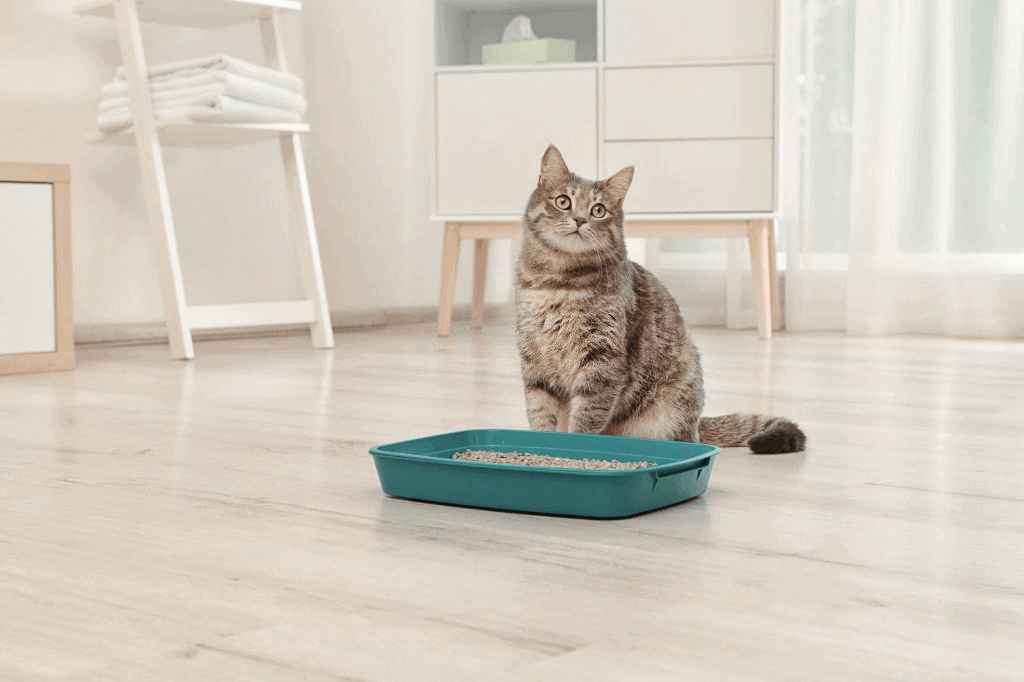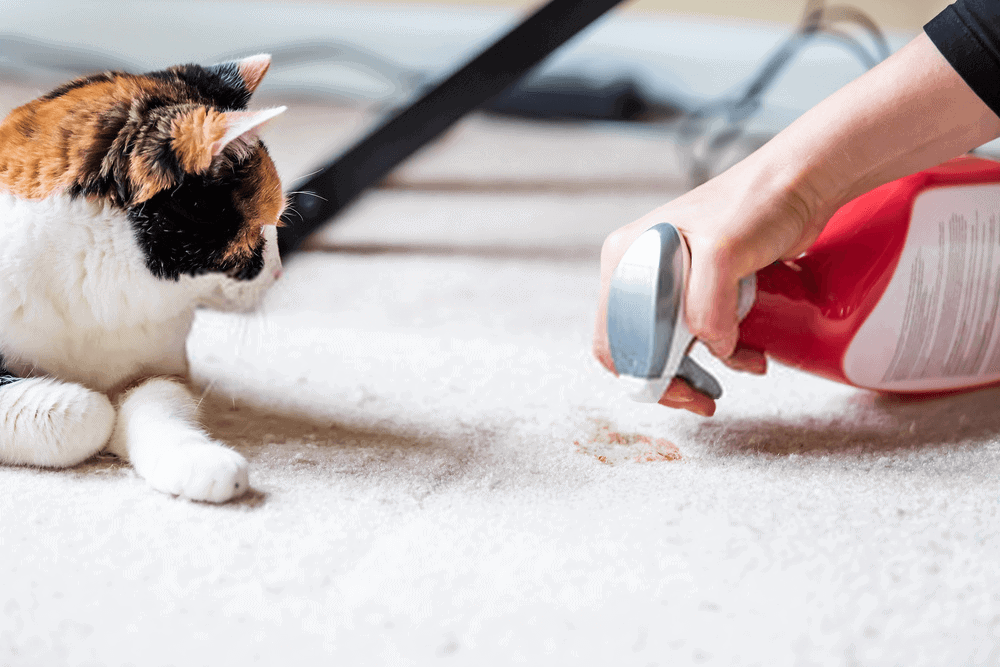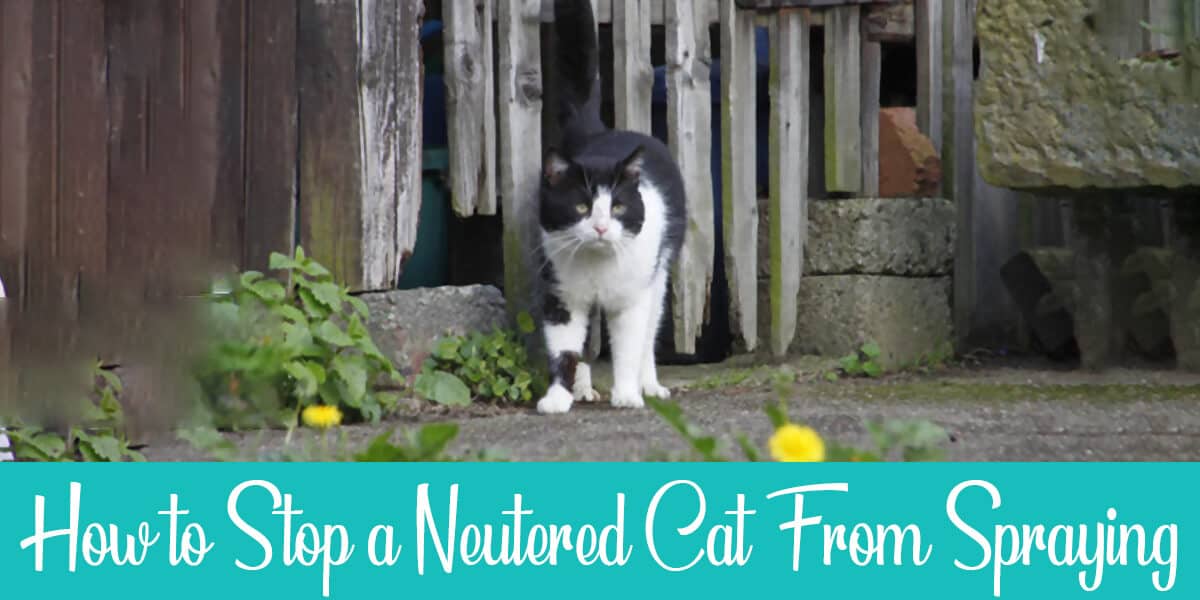You’re probably spending tons of time with your furry friend due to the self-isolation guidelines given by the government and the World Health Organization (WHO). Unfortunately, this also means that you get to observe some of your cat’s quirky behaviors.
They’ll walk in their litter boxes and then climb onto your kitchen counter where you eat your meals. Another unpleasant behavior that cats have is spraying and urine marking around your home. While you may not be able to get your cat off the dinner table on time, there are a couple of things you can do to stop your neutered cat from spraying.
Table of Contents
How to Tell that Your Cat Is Spraying
If you don’t have much experience in caring for cats, you might not be able to differentiate inappropriate elimination from spraying.
The key difference between these two is the spot that your kitty chooses. Usually, cats spray on vertical surfaces whereas inappropriate elimination occurs on horizontal surfaces.
So if the puddle is on an upright surface like a wall or piece of furniture, this is a clear sign that your cat is spraying. Even if you don’t see a puddle, you’ll start noticing a strong ammonia-like smell. And if you inspect your furniture, you’re likely to find urine stains or damp spots.
7 Ways to Prevent a Neutered Cat From Spraying
Get more litter boxes

One of the reasons why your furball might be spraying around the house is because there aren’t enough litter boxes.
As a rule of thumb, you should have one litter box per cat and an extra one. So if you have three cats, you should have a minimum of four boxes.
Doing this ensures that every cat has access to a litter box anytime they need one. It’s also a great idea to have a litter box per floor if you live in a multi-storey home.
Change cat litter frequently
Simply because you have additional litter boxes doesn’t mean that you should clean less frequently. As a cat owner, one of your key responsibilities is to clean up your kitty’s litter box and place fresh litter at least every other day.
If you’re not available to change out the litter, consider investing in a self-cleaning or automatic litter box. Such a device is equipped with a rake that automatically removes waste from the box. It then deposits it into a receptacle that you can empty out later. This ensures that your cat always has a clean litter box to use; hence, less likely to spray.
Clean up existing spray marks in your home

If your cat has sprayed in a spot where they shouldn’t, you’ll need to clean it as soon as you can. Otherwise, the smell of these marks will attract your kitty to come back and spray a second time.
Put warm water in a container, and add a couple of drops of mild soap to it. Next, take a clean piece of cloth and wipe the wet spot with the soapy water. Blot the surface using an absorbent material like a cloth or paper towel.
Even after cleaning the area thoroughly, it’s likely that some traces of urine will remain. To get rid of the pet odor, saturate the area with an enzyme-based cleaner then give it time to air-dry.
Minimize conflict between pets
A common reason why neutered cats spray is due to conflict. Whether it’s a conflict with other cats in your home or from outside, their spraying is a response to fear and intimidation from fellow pets.
If the conflict is between pets in your home, ensure you’re providing adequate resources to each cat. This way, there won’t be any reason for the cats to battle each other.
However, if your cat is being bullied by an outdoor stray cat, ensure you restrict their access. Keep your cat indoors and close all the windows and blinds to prevent them from escaping. If your cat has to go outside, offer supervision by keeping them on a leash.
Create a reassuring environment
Has your cat been feeling anxious, stressed or scared recently? Chances are, this is why they’re spraying around your home.
Your cat’s anxiety could be caused by several things. Introducing a new pet, relocating, remodeling and other noisy events in their surroundings are all things that can trigger anxiety in cats.
The best remedy for your kitty’s anxiety, and subsequently, their spraying behavior is to create a more conducive environment. Here are some tips that can help:
● Get rid of stress triggers- for instance, if the environment is too noisy for your kitty, find a way to soundproof their play and resting space.
● Make time to play and interact with your cat– you can play a game of catch the laser or brush their coat.
● Create a space where they can hang out or rest without being bothered by other pets
● Feed them the same time each day- maintaining consistency is a nice way to make your cat feel safe
Try the Cat Spraying No More program
If you’ve tried every trick to stop your neutered cat from spraying, and nothing seems to work, this book might help. Cat Spraying No More is a program invented by the veterinarian and experienced cat owner, Sarah Richards.
In her book, Sarah provides a comprehensive step-by-step approach to how you can stop your cat from spraying. The text contains 11 chapters, and it starts with an explanation of why cats resort spraying.
In the next couple of chapters, the author recommends specific changes you can make to your home to improve this situation. The last chapters detail herbal recipes that have also been proven effective in preventing cat spraying.
Consult your veterinarian

It’s also crucial that you pay your veterinarian a visit. This is because a cat’s spraying behavior could be the result of an underlying health issue. Medical conditions such as diabetes, feline lower urinary tract disease, urinary tract infection and kidney disease and liver disease can all cause your kitty to spray.
Once you go to the vet, they will run a series of tests to rule out every condition. These tests will range from blood and urine samples to imaging examinations. If the vet concludes that your cat is healthy, then it’s likely that their spraying is behavioral.
If your feline friend is suffering from urinary tract issues, you should opt for a diet like the c/d cat food or any of its alternatives.
FAQs
Do female cats spray?
The short answer to this is yes. Even though spraying is more common among unneutered males, just about any cat can engage in this behavior- including females.
As Dr. Cindi Cox explains, all cats can spray either because of medical issues, litter box problems or anxiety.
How do I get rid of cat spray smell?
If your cat’s urine smell is making your home inhabitable, there are a few remedies you can try:
● Clean up the mess immediately- if you catch your cat spraying, don’t wait until later to clean up. The longer the urine sits on a surface, the worse it will smell.
● Use a solution of vinegar- vinegar, while it has a distinct smell of its own, is pretty good at removing bad odor. Mix three cups of water with one cup vinegar to create an effective cleaning solution. If you wish, you can also add some baking soda, which will serve to absorb and neutralize the bad smell.
● Invest in an enzyme-based cleaner- as mentioned earlier, another remedy that works is an enzyme cleaner. This one works by breaking down the acidic molecules in cat urine. It also helps to get rid of the smell.
● Air the room- after cleaning the area where your cat sprayed, ventilate the entire space. You can also use scented candles or an air freshener to make the room more habitable.
While these tips help, there’s one thing that can make the situation worse. To be specific, you should steer clear of ammonia-based cleaners. Remember cat pee already has ammonia. This means that cleaning with ammonia solutions will only draw your kitty back to their spraying spot.
You also shouldn’t use bleach. This product only serves to disinfect not get rid of the urine odor. Furthermore, inhaling bleach is dangerous not only for you but also for your pets.
Wrap Up
If your neutered cat has been spraying to mark his territory, there are several things you can do to change this. First, figure out why they’re engaging in this behavior.
This way, it will be easier to address the problem. For instance, if your cat is spraying because of an underlying medical issue, then you can use medications. Similarly, if they’re spraying because they’re stressed or anxious, you can make the environment more conducive for habitation.
Another way to discourage your cat from spraying is to clean up sprayed marks. We recommend using an enzymatic cleanser as it’s pretty effective at neutralizing pet odors. You can also invest in the Cat Spraying No More book. Written by Sarah Richards, this text highlights everything you need to know about cat spraying and what you can do to stop it.

I’ve been living with cats since 2008 and I can confidently say I have more feline friends than humans lol. I currently live with 5 cats in different life stages; two of them are less than one year old, one is 2-ish years old and the oldest two are 9-ish years old. I’ve developed a strong bond with cats over the years and I’m eager to share my experience through this blog. You can learn more about my cats here.

